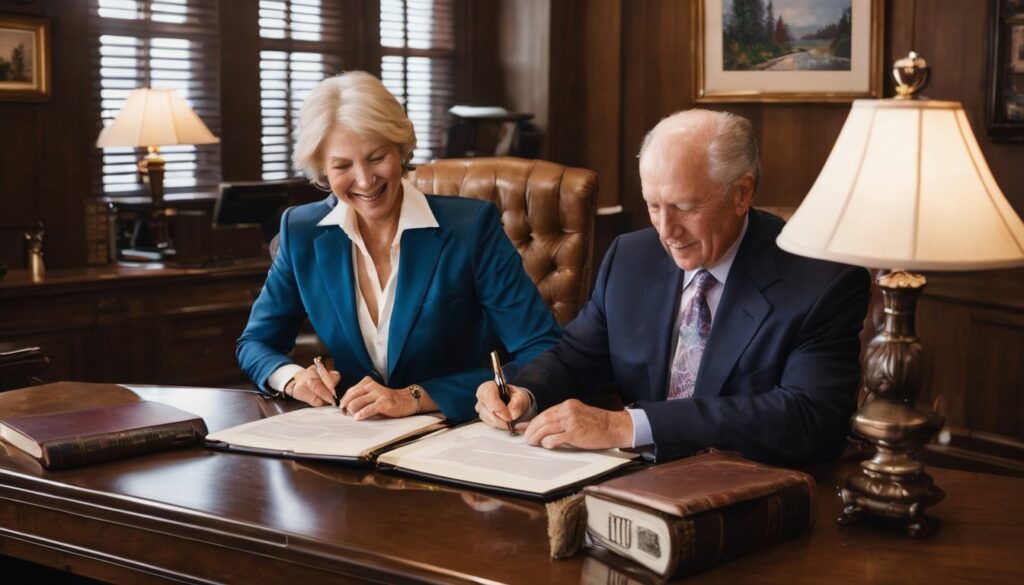I am excited to share with you my journey in mastering the art of estate planning. This isn’t something that happens overnight, nor is it an endeavor that one can undertake alone. It was a process steeped in learning, understanding, and more importantly, guided by the unerring expertise of an estate attorney.
Just like many of you, I used to perceive estate planning as a chore meant for those wealthy enough to own properties and assets that spanned continents. However, my understanding drastically changed as I stumbled upon the stark reality that estate planning is not a luxury, but a necessity for everyone, regardless of wealth or age.
Finding myself plunged into this labyrinth of legalities, I quickly realized the enormous complexity of estate planning. There were countless factors to consider, legal intricacies to navigate, and potential pitfalls to avoid. It was at this juncture, I understood the vital role an estate attorney plays.
My estate attorney was more than just a legal professional handling paperwork. He was a guide, helping me traverse the landscape of laws, a mediator in family discussions, a strategist carving out the best plan for my assets, and a friend who understood the sentimental value behind every hard-earned possession. It was an enlightening experience, shedding light not only on the importance of estate planning but also on the critical role an estate attorney plays in the process.
Mastering the Art of Estate Planning is a journey, an expedition that might seem daunting initially, but with the right guidance and support, it can be remarkably enlightening. In this book, I hope to share my experiences, the lessons I’ve learned, and most importantly, the profound impact an estate attorney can have on this journey. If you’re standing on the precipice of this expedition, I hope this book will offer you the courage to take the leap.
A Roadmap to Understanding the Role of the Estate Attorney in Estate Planning
The Importance of Setting Your Affairs in Order
Estate planning is a crucial process that involves setting your affairs and assets in order before your death or incapacitation. It is an opportunity to ensure that your loved ones are protected, and your legacy is secured. Many people believe that estate planning is only for the wealthy who have complex estates or those approaching retirement age.
However, everyone should consider estate planning regardless of their net worth or age. Properly planned estates help avoid complications and disputes among family members.
When a person dies without a will, their assets are distributed according to state laws, which may not align with their wishes. This often results in unnecessary legal battles and high legal fees for heirs.
Understanding Estate Planning
Estate planning refers to the process of arranging for the transfer of one’s assets during life or after death. It involves creating legally binding documents such as wills, trusts, living wills, powers of attorney, among others.
The primary objective of estate planning is to ensure that personal and financial goals are met while minimizing taxes paid. Estate planning also involves taking into account various aspects such as family dynamics, business interests, charitable giving goals, real estate holdings, retirement plans, life insurance policies – all these elements define how one’s assets will be distributed upon death.
Role of an Estate Attorney in Estate Planning
Estate attorneys play an essential role in guiding individuals through the complex process of estate planning. They provide legal counsel on various aspects such as tax strategies for transferring wealth efficiently and effectively.
They understand state and federal laws governing estates hence can advise clients on how best they can minimize taxes associated with transferring their wealth. Moreover, they help draft legally binding documents that outline specific instructions on how the client’s wealth should be distributed and managed in the event of their death or incapacitation.
Estate attorneys also assist in managing and administering trusts, which can be an excellent tool to preserve wealth and protect assets from creditors. Estate planning is crucial for everyone regardless of their net worth or age.
An experienced estate attorney is critical to ensuring that clients’ wishes are met; heirs are protected while minimizing taxes paid. In the next section, we will explore what an estate attorney is and the skills required to practice in this area of law.
What is an Estate Attorney?
Estate attorneys are legal professionals who specialize in estate planning, which is the process of creating a plan for the management and distribution of assets after death. They work with clients to determine their goals and needs and then create legal documents such as wills, trusts, power of attorney, and living wills. Estate attorneys also help clients minimize taxes and avoid probate court.
Definition and Qualifications
To practice as an estate attorney, one must first obtain a law degree from an accredited law school. After graduation, they must pass the state bar exam to become licensed to practice in their jurisdiction. Some states also require additional certification or specialization in estate planning.
Skills and Expertise Needed for the Job
To be successful as an estate attorney, several skills are required. First, they need excellent communication skills to effectively communicate complex legal concepts with clients who may not have a legal background.
Attention to detail is crucial since creating legal documents requires precision. Beyond that, they should have knowledge of tax law, property law, family law as well as basic financial knowledge.
Responsibilities of an Estate Attorney
An estate attorney has many responsibilities that vary according to the scope of their engagement with clients. Their primary job is to guide clients through the process of creating a comprehensive plan that considers all aspects of their lives both now and in the future. This involves assessing current assets and liabilities as well as making recommendations on how best to manage them for efficient transfer after death or incapacity.
Additionally, they can provide advice on healthcare decisions if needed by recommending living wills that specify individual wishes about end-of-life care. Estate planning can be complex with various tax laws regarding probate courts; thus requiring expertise from qualified professionals like experienced estate attorneys whose primary role involves guiding individuals through this intricate process.
Overview of the Estate Planning Process
Estate planning involves creating a comprehensive plan for an individual’s assets and properties in the event of their death or incapacity. The process typically involves an estate attorney who guides the client through each step of the process. To begin, the estate attorney will gather information about the individual’s assets, including any properties, investments, insurance policies, and other financial accounts.
From there, they will identify potential tax implications and determine how best to structure the estate plan to minimize those taxes. The estate attorney will then work with the client to identify their specific needs and goals for their estate plan.
This may include determining how to distribute assets among family members or charitable organizations, protecting certain assets from creditors or bankruptcy proceedings, or establishing guardianships for minor children. Once these goals are identified, the attorney can begin drafting legal documents that reflect these objectives.
Identifying Client Needs and Goals
One of the most important roles of an estate attorney is identifying a client’s unique needs and goals for their estate plan. This requires careful consideration of several factors such as family dynamics, current financial situation, future goals and aspirations as well as any unique circumstances that may impact the decision-making process.
For example, if a client has children with special needs or wants to leave money to a particular charity organization after they pass away, these factors would be taken into account when crafting legal documents like wills or trusts. With this information in hand, an experienced estate attorney can develop an effective strategy that ensures all aspects of a client’s legacy wishes are met while also addressing any potential legal issues that may arise within this process.
Drafting Legal Documents (Wills, Trusts etc.)
After identifying a client’s specific needs and goals for their estate plan in detail with them – it is time for drafting legal documents like Wills & Trusts. These legal documents are the backbone of any estate plan and provide important instructions for how a client’s assets should be managed and distributed after their passing. A will is a legal document that outlines an individual’s wishes regarding the distribution of their assets.
In contrast, a trust is a legal arrangement in which one person holds property for the benefit of another person or persons. A trust can be established during an individual’s life or after death via the client’s Will.
The estate attorney will work closely with the client to ensure that these documents reflect their unique goals and wishes, while also adhering to applicable laws and regulations regarding estate planning. These documents may also need to be updated periodically as circumstances change or new tax laws are enacted.
Advising Clients on Tax Implications and Strategies
An experienced estate attorney can play an important role in helping clients navigate complex tax issues associated with estate planning. This includes identifying potential tax liabilities that may arise upon death, such as inheritance and estate taxes, as well as strategies for minimizing those taxes.
For example, an estate attorney may advise clients on gifting strategies that can reduce their taxable estates while ensuring that specific assets are distributed according to their wishes. They may also recommend establishing trusts to protect certain assets from taxation or creditors.
Ultimately, the goal of any tax planning strategy is to maximize the value of a client’s assets while minimizing potential tax burdens upon distribution or transfer. An experienced estate attorney can provide valuable guidance throughout this process, ensuring that clients have access to all available tools for protecting their wealth and achieving their long-term financial goals.
Facilitating Asset Transfers and Distribution
After all necessary legal documents have been drafted by the attorney – it becomes time for asset transfers & distribution among beneficiaries mentioned in these documents. The process involves transferring ownership or control over assets like properties, investments accounts etc., from one entity (usually deceased client) to another (usually their heirs).
The estate attorney is responsible for ensuring that these transfers are carried out in accordance with the client’s wishes and any applicable laws. This may involve working with financial institutions, accountants, and other professionals to facilitate asset transfers and ensure that all tax obligations are properly handled.
Representing Clients in Court Proceedings
Unfortunately, disputes can sometimes arise after a client’s passing concerning the validity of a will or trust. In such circumstances, an estate attorney can represent clients in court proceedings aimed at resolving these disputes. These proceedings can be complex and expensive, but an experienced estate attorney can provide clients with valuable guidance throughout the process.
This includes identifying potential legal issues early on, developing effective strategies for addressing those issues, and representing clients in court if necessary. Overall, having an experienced estate attorney by your side during all phases of the estate planning process is crucial for ensuring that you get the best results possible while also protecting your legacy wishes effectively.
Special Considerations for Specific Types of Estates
Small Estates: Navigating Complexity with Limited Resources
When it comes to estate planning for small estates, there are a few key considerations that must be taken into account. One of the biggest challenges is navigating the complexity of the legal system with limited resources.
Often, small estates do not have the financial means or personnel necessary to manage all of the legal requirements and tax implications that come with estate planning. In order to effectively plan for a small estate, an experienced estate attorney must be able to simplify complex legal concepts and strategies into easy-to-understand terms.
They will also need to be resourceful in finding creative solutions for asset transfers and distribution, such as utilizing joint tenancy or transfer-on-death arrangements. Additionally, they may need to advise on strategies for minimizing taxes and fees, including taking advantage of state-level exemptions and deductions.
Large Estates: Managing Complexities and Maximizing Benefits
Estate planning for large estates presents its own set of challenges and opportunities. With larger assets at stake, there is typically more complexity involved in drafting legal documents and advising clients on tax implications and strategies.
Additionally, there may be concerns about preserving wealth across multiple generations or ensuring that certain charitable organizations receive a portion of the assets. An experienced estate attorney can help manage these complexities by working closely with other financial advisors, such as accountants or investment managers.
They can also advise on advanced strategies such as irrevocable trusts or family partnerships that can help maximize benefits while minimizing taxes. However, it is important to note that these strategies often require significant upfront costs and ongoing maintenance fees.
Business Owners: Protecting Assets while Ensuring Business Continuity
For business owners who are also considering their estate planning needs, there are additional considerations involved in protecting both personal assets and ensuring business continuity. One of the most common estate planning strategies for business owners is to establish a buy-sell agreement that outlines what will happen to the business in the event of an owner’s death or disability.
This can help ensure that the business remains in capable hands and provides financial security for the owner’s family. An estate attorney can also advise on strategies for protecting personal assets, such as creating a trust to hold personal assets separate from business assets.
Additionally, they may need to advise on tax implications related to selling a business or passing it on to heirs. With careful planning and execution, an experienced estate attorney can help ensure that both personal and business assets are protected while also providing peace of mind for both the owner and their loved ones.
Conclusion
After reviewing the role of an estate attorney in estate planning, it is clear that hiring an experienced estate attorney is crucial to ensuring that your estate plan meets your needs and goals. An estate attorney can help you navigate the complex legal requirements of a well-crafted estate plan, and provide valuable advice on tax implications and asset transfers.
One key takeaway from this article is that every individual should have an estate plan in place, regardless of the size of their estate. It’s important to work with an experienced attorney who can identify your unique needs and goals and help you create a plan that achieves them.
With proper planning, you can ensure that your assets are distributed according to your wishes, avoid family disputes over inheritance, and potentially minimize tax liability. Another important point is that the role of an estate attorney extends beyond just drafting legal documents; they play a vital role in advising clients on tax strategies, asset transfers during life, and represent clients in court proceedings when necessary.
An experienced attorney will have the requisite skills and expertise to provide comprehensive support throughout all stages of the process. Hiring an experienced estate attorney is essential to achieving a successful and effective estate plan.
A good lawyer will help you understand all aspects of the process — from identifying client needs to drafting legal documents — ensuring peace of mind for both you and your loved ones. By working with a trusted advisor, you can rest assured knowing that your legacy will be protected for generations to come.





